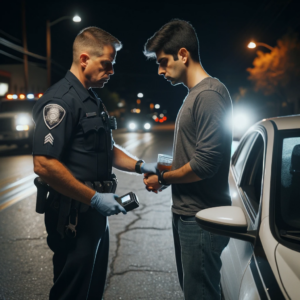
In Minnesota, as in most states, detection for Driving While Intoxicated (DWI) or Driving Under the Influence (DUI) typically involves various scientific methods to measure blood alcohol concentration (BAC) or any amount of drugs in a driver’s system to assess a driver’s impairment. Here is the scientific testing they might to do see if you are under the influence.
Standardized Field Sobriety Testing (SFSTs)
While not what a person commonly thinks of as scientific testing, SFSTs are backed by studies and science. Because of they are scientific in nature they need to be completed in the exact same manner, every time no matter the weather conditions. SFSTs are a series of physical and mental tests, referred to as divided attention tests, which are administrated by law enforcement officers at the scene of the stop. They are used to assess a driver’s level of impairment based on performance. The common battery of SFSTs are horizontal gaze nystagmus (HGN), walk-and-turn test (WAT), and the one-leg stand test (OLS).
Preliminary Breath Test (PBT)
A PBT is a small handheld breath testing device used by law enforcement officers at the scene of a traffic stop. It provides a quick assessment of a driver’s BAC. The machine cannot test for drugs. The results of the PBT are used to determine if an officer has probable cause for an arrest. The results are not admissible in trial except in limited circumstances. It is common for individuals to confuse the PBT for a more scientific test called the Intoxilyzer or DataMaster.
Intoxilyzer or DataMaster Test
The Intoxilyzer or DataMaster (DMT-R) is a more sophisticated breath testing machine. It is typically used at a law enforcement center after an arrest for DWI. It requires more of a ridged protocol than a PBT. For example, Minnesota law requires a 15-minute observation period before administering. This is done to ensure that the individual does burp, belch, or vomit, (BBV) as these actions would affect the accuracy of the breath test results. Other factors such as being diabetic, mouth alcohol, or improper operation can significantly alter the results as well.
Tests that Requite a Warrant
Blood Test
Blood tests are considered more accurate than urine or breath tests. They are often administered when law enforcement suspects drug impairment or when a driver is unable to provide a breath sample. A qualified medical professional or a specially trained law enforcement officer, draws the blood. Two vials of blood are drawn. Both samples are then sent to a laboratory for analysis at the Bureau of Criminal Apprehension (BCA). If you are offered a blood test you can opt to take a urine test in the alternative. Results are not immediate and can take more than 8 weeks to receive.
Urine Test
Urine tests are less common in DWI cases but may be used to detect the presence of drugs, along with alcohol. They are considered less reliable than blood tests and may not accurately reflect the level of impairment at the time of driving.
Urine tests can detect drugs or alcohol for a longer period than blood or breath tests. The detection window of metabolites depends on factors such as the specific drug, its half-life, and the individual’s metabolism. While blood and breath tests provide a snapshot of current intoxication by alcohol or certain drugs, urine tests may show drug use in the past.
The urine collection process involves providing a urine sample, in a secure and supervised setting to prevent tampering. The collected sample is then sent to the BCA for analysis.
Conclusion
It is important to remember that Minnesota has an implied consent law. An implied consent is civil in nature and focuses on a person’s driver license. If you do not submit to one of these scientific testing protocols, you can lose your license for a longer period of time, or it could result in jail.
Tom Hagen is a partner at Kohlmeyer Hagen. He is an award-winning lawyer with offices in Mankato and Rochester Minnesota. He focuses his practice solely on criminal defense.
